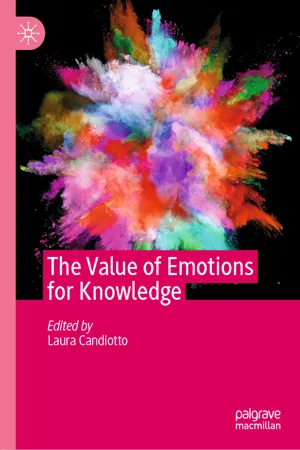This volume consists of twelve full-length articles by leading and up-and-coming academics on the exciting topic of philosophy of emotions. This very multidisciplinary field of research focuses on the different roles that emotions play in our life. Significant work has been done in the area of moral philosophy , for example highlighting the weight of emotions and other affective states in nurturing our moral concerns, leading our decision-making, and also disclosing what it is that we care about most.1 The aim of this volume is to analyse the role of emotions in knowledge acquisition , in its many and different processes and functions, especially focusing at the intersection between epistemology and the philosophy of mind and cognitive science . In fact, if we easily recognise the value of emotions in our moral life, it is difficult to not think that emotions impair knowledge, intrude on reasoning, and express our epistemic faults and self-deception .2 And we should thus admit that these seemingly bad emotional behaviours have strong implications for moral judgements too. Emotions disrupt very often indeed, just think about the emotional biases and implicit prejudices that hinder our correct understanding of a thing, or how fast we judge a person poisoned by ill-founded jealousy and rivalry. But, we should concede, emotions can also make the process of inquiry appealing, for example nurturing our motivation towards knowledge acquisition , or letting us perceive the salience of an experience for our self-understanding , as the trend of emotional intelligence in pop-culture has very well emphasised—although with commercial exploitations, in certain cases.3
Neuroscientists have discovered the integrated functionality of emotions and reasoning in our mental life . Emotions are now understood as a constitutive element of human rationality, grounding concept creation and deliberative thinking, and partaking in the various cognitive processes , rather than being framed in opposition to rationality (Gray et al. 2002; Pessoa 2008, 2013).4 Although the value of emotions in our mental life has been recognised by cognitive science , epistemology has remained a bit suspicious about it. It is true that some important pieces of work in the epistemology of emotions have been already developed especially by those philosophers who look at the science of mind for illuminating questions about the nature of emotions.5 But as Christopher Hookway (2003) has clearly stated, everyone would agree in ascribing to jealousy or anger our intellectual mistakes, however very few theorists would accept ascribing a positive role to our affective responses in the formation of reliable beliefs . In fact, granting a significant role to emotions in cognitive performances does not mean to also admit their truth-conduciveness —and only the latter should count for epistemology.
One of the innovative traits of this volume is to discuss the conditions that rule the beneficial role that affective states as emotions, meta-emotions , and moods can play in our epistemic practice , avoiding their popular shortcomings, but also the extreme rationalism which refuses to ascribe any positive epistemic function to them. In epistemology as a normative discipline, it is fundamental to ask what counts as acquiring or having the knowledge, what contributes to epistemic success and at which level, what possesses epistemic relevance and salience. This volume shows that emotions do count for our epistemic enterprise, and against the scepticism about their possible positive role in knowledge, it highlights the how and the why of this potential, also exploring aspects of their functionality in relation to specific kinds of knowledge.
But what does it mean that emotions contribute to knowledge? In the history of philosophy many answers have been offered to reply to this question , focusing on specific emotions—for example love as one of the best driving forces to truth in Plato and Scheler—beliefs’ a priori grounding, as in the Scottish Sentimentalism and German Romanticism, metacognitive feelings as emotional attunements to reasons6 or, as in the case of doubt, affective evaluations of the epistemic status of a belief in the Pragmatist philosophy, and affective dispositions to world experience in the Phenomenological and Existentialist traditions.7 But instead of specifically looking to our rich philosophical history,8 this volume addresses the fundamental questions that underlie the deep entanglement between emotions and knowledge, asking for the criteria that can grant it, and assessing them. In addition to questioning the epistemological relevance of emotions, much of the work undertaken in this volume is directed to specific types of knowledge, such as self-understanding , group-knowledge , and wisdom, and to specific functions played by certain emotions in these cases, such as disorientation in enquiry and contempt in practical reason. Therefore, this volume draws special attention to how the function of emotions in knowledge is dependent on the types of knowledge—and why emotions’ efficacy increase in relation to specific epistemic practices. This means that the volume highlights the necessity of studying the epistemic relevance of specific types of emotions in precise epistemic contexts. Focusing on epistemic practices, as the revision of beliefs or collective enquiry , the volume also considers the role played by epistemic subjects and communities in epistemic agency, thus discussing the epistemic significance of their affective states in belief-forming practices.9
In addition to highlighting the innovative character of the volume, the aim of this introduction is also to discuss the relevance that emotions can play in our epistemic life considering the state of the art of the philosophical debate on emotions. The debate that lies at the interface between epistemology, theory of emotions, and cognitive science has been taken into consideration by some other important publications in the last years, as the edited volumes Epistemology and Emotions by Georg Brun et al. (2008) and Emotions and Value by Sabine Roeser and Cain Todd (2014), the very popular handbook by Julien Deonna and Fabrice Teroni, The Emotions (Deonna and Teroni 2012), the introduction to the philosophy of emotion by Carolyn Price (2015), and the new one by Michael Brady (2018), and some of the chapters of the Oxford Handboo...
